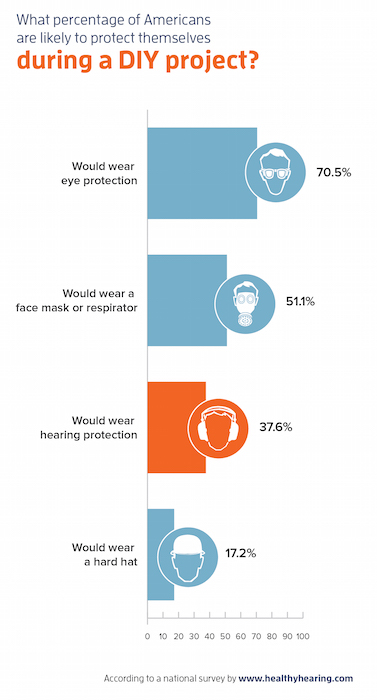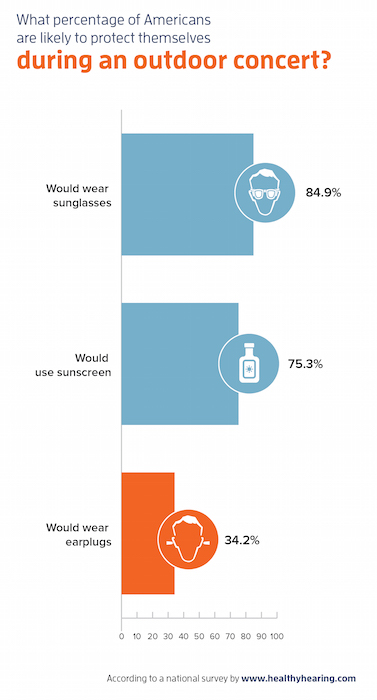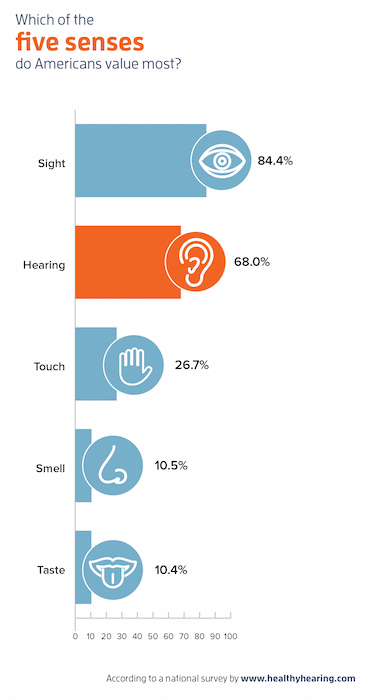[ad_1]
Contributed by Lisa Packer, and Paul Dybala, PhD
A national survey of more than 1,000 people in the U.S. shows Americans value hearing highly compared to most other senses. At the same time, people usually do not think about taking steps to protect their hearing, but readily take precaution to protect other senses.

National survey on attitudes toward the senses
What kind of importance do you place on your hearing? With numbers of those with hearing loss on the rise due to the aging baby boomer population, it is an increasingly relevant question. According to research conducted with the National Health and Nutritional Examination Surveys, more than 30 million people in the United States have hearing loss, with millions more at risk. That means you are probably among them. But do you care?
Healthy Hearing conducted a national survey of 1,043 people asking how they felt about their hearing as compared to their other senses, and what kind of a priority they place on hearing. Survey participants were balanced to reflect the average demographic of persons in the U.S. (see details below), and the results show most Americans place hearing far behind the other senses in terms of self care.
Would you protect your hearing during a home improvement project?
When survey participants were first presented with the hypothetical scenario of doing a heavily tool-involved home improvement project. only 37.6 percent of respondents said they would be “likely” or “very likely” to use earmuffs or earplugs to protect their hearing. Yet 70.5 percent of the same respondents said they would be “likely” or “very likely” to wear goggles or glasses to protect their vision. To put it another way, out of eight protective options given, including work clothes, gloves, a respirator, a hard hat, earplugs, goggles, work boots and knee pads, earplugs ranked second to last, just ahead of a hard hat.
How likely are Americans to use hearing protective gear during a DIY project?
- 37.7 percent hearing protection
- 70.5 percent eye protection
Would you protect your hearing during an outdoor concert?
Unfortunately, subsequent questions showed the general response to the home improvement project question wasn’t an anomaly. When respondents were asked about items they would be most likely to bring to a sunny outdoor concert, at which they would be seated close to the stage, only 34.2 percent of respondents said they would be “likely” or “very likely” to bring earplugs. Again, the results show respondents value vision and other senses far more than hearing, since 84.9 percent were likely or very likely to bring sunglasses. Earplugs ranked second to last.
How likely are Americans to protect their hearing during an outdoor concert?
- 84.9 percent sunglasses
- 75.3 percent sunscreen
- 34.2 percent earplugs

Do Americans value their hearing?
Yet when asked to rank their senses directly in terms of value, 68 percent of people ranked hearing as most important, after vision (84 percent.) So what does that tell us? In short, it tells us that people are “hearing hypocrites.” They talk the talk, but don’t walk the walk when it comes to their hearing.
The survey established the majority of the Americans are not likely to take measures to protect their hearing. This is surprising when 15 percent of adults between the ages of 20 and 69 have noise-induced hearing loss, and 30 to 50 million more people are at risk each day in the United States alone from both leisure activities and work related activities according to the NIDCD.
What about persons who already have hearing loss?
But what about those who already have hearing loss? Are they willing to take measures to improve their hearing? Not likely. When survey respondents were asked the question “Do you have trouble understanding what people say?” Twenty-two percent of respondents said “yes.” However when asked if they use hearing aids, only 5 percent of those same respondents answered “yes.” That means only one-fifth of people who need them actually get hearing aids. Barring affordability, which is certainly a significant factor in many people’s lack of hearing aid use, stigma, lack of information and difficulty of use remain barriers. Why do Americans have this attitude toward hearing?
Since human beings are visual by nature, it is not surprising to see these results. Hearing loss has been called the invisible disability; you cannot look at a person and tell if they have a hearing loss.This is also reflected in the way we think about protecting our hearing. Loud music is more often or not thought to be “cool” whereas too much exposure to the sun is considered dangerous. If hearing loss could kill you, would people take more notice?
Paul Dybala, President of Healthy Hearing, thinks so. “When most people go outside they think about being able to see well, so they put on sunglasses. They think about protecting their skin from the harmful rays of the sun, so they put on sunscreen. Every spring when we go into the grocery store, we see all the sunglass and sunscreen displays moved to the front of the store. It is almost impossible not to think about these things. There have been massive national campaigns to do things like, drink plenty of water and protect your skin from cancer,” Dybala continues. “Every summer we hear about malaria and how areas are being sprayed to keep the mosquitos down. We don’t hear as much about protecting your ears. There has been a general push to have Americans be more “health conscious” and this is a good thing. But these messages have not included protecting your hearing.”

Refocusing the attitudes of Americans toward hearing health
Hearing health professionals can do their part to create awareness and encourage people to seek treatment. A good place to start is by encouraging hearing screenings and as well as encouraging people to turn down the volume on their devices. You can also approach local community groups, such as Rotary clubs or Lions clubs, and ask if you can come and speak or drop off materials. Assisted living facilities are always in need of accurate hearing related information, and don’t forget about the schools in your community; it is never too early to talk to kids about protecting their hearing.
What does this survey mean for someone with hearing loss? It means you are not alone. Hearing loss is quite common, and most people don’t prioritize their hearing as much as they do other health issues. The reason could be that unlike other health issues, hearing loss is easy to ignore. After all, it isn’t physically painful, and it won’t kill you.
Hearing loss is an overall health related issue. Hearing loss isolates you from other people and research has recently documented the effects of that. A study recently published in the Journal of the American Geriatric Society of 3,670 adults over the age of 65 over a 25 year period showed a greater degree of cognitive decline for those who had untreated hearing loss compared to those who used hearing aids. As a matter of fact the rate of cognitive decline among those who did use hearing aids was the same as that of those with normal hearing.
“What it comes down to is that we need to change the attitudes of Americans toward hearing loss to not only prevent hearing loss, but to ensure that if it occurs, proper treatment is given to these individuals,” said Dybala. “Fortunately we now know treatment can be helpful for many overall health reasons, but especially to prevent cognitive decline.”
Complete details of Healthy Hearing survey
Survey conducted by Healthy Hearing in January 2015 using the U.S. Panel from Survey Monkey Audience. 1,043 respondents, margin of error +-3% with 95% confidence interval.
Question 1: Imagine that you were going to work on a project to update a room in a house. The project will require the use of tools such as: hammers, nail gun, saws, sander, drills, sledgehammer and includes staining the floors and painting the walls. Please rate on a scale from one to five how likely you would be to actually use any of these items during that project.
Percentage of respondents that selected four (likely) or five (very likely):
- 77.3% Work clothing
- 74.6% Gloves
- 70.5% Goggles or glasses
- 59.9% Work boots / shoes
- 51.1% Face mask or respirator
- 40.0% Knee and/or elbow pads
- 37.6% Earplugs or earmuffs
- 17.2% Hard hat
Question 2: Imagine that you were going to an outdoor rock concert during the day, you have seats close to the stage and the forecast is sunny. Please rate on a scale from one to five how likely you would be to actually bring an item to the concert.
Percentage of respondents that selected four (likely) or five (very likely):
- 86.1% Bottle of water
- 84.9% Sunglasses
- 75.3% Sunscreen
- 62.3% Hat
- 57.0% Lip balm
- 46.1% Mosquito repellant
- 43.0% Sun protection clothing
- 36.9% Hand sanitizer
- 34.2% Earplugs
- 29.5% Towel
Question 3: Please rank order how valuable you think your senses are from highest (1) to lowest (5)
Percentage of respondents that ranked sense as one or two:
- 84.4% Ability to see
- 68.0% Ability to hear
- 26.7% Ability to touch/feel
- 10.5% Ability to smell
- 10.4% Ability to taste
Question 4: Do you currently have any problems with your hearing (understanding what people say)?
Question 5: Do you currently use hearing aids?
[ad_2]
Source link

